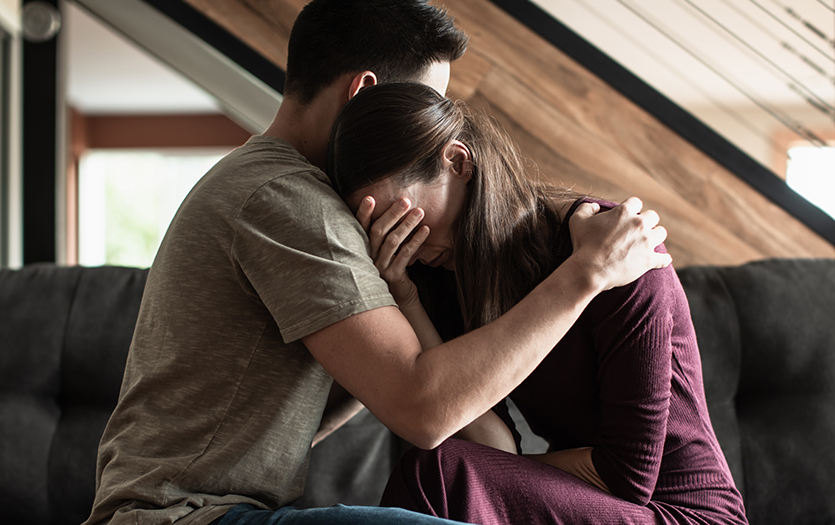
Being kind to yourself, making time to rest and sharing your memories and sadness with others can help lessen your burden. Cathy Petrie, MSW, LCSW, bereavement counselor, and Chaplain Ken Weaver, have led bereavement support groups for Parkview Home Health & Hospice for 15 years in counties across Parkview’s service area. Recently, they shared some wisdom on how best to cope with grief during the holiday season.
The holidays can be overwhelming to folks sometimes, even with family members or friends around and the busy planning of events. What are some good ways to process brief moments or happenings that remind someone of a loved one who has passed?
Look ahead at the calendar and events that may involve your loved one’s memory. Reflect on past times that you shared and anticipate that those memories will come. Prepare how you might respond to soften the pain when you know it will be a challenge. Doing less, spending less time on an activity, and embracing the tears and sadness as a part of this particular year with the help of others are some ways to cope. Discuss your plan with a “grief buddy” or bereavement counselor.
Even if you plan ahead, the unexpected may still happen. Pause, if you can. Mix the pain of the moment with memories of your loved one’s smile and their love and confidence in you. Embrace it for yourself and for them since they are not physically here to share it. Tell someone about, or show them, the present moment and share how much it would have meant to your loved one and how you miss them.
When a person feels overwhelmed, what are some ways they can calm themselves?
Carry soft tissues for unexpected tears and to comfort yourself. Have small items and pictures with you that connect you to your loved one so that you may look at them for comfort. Contact that friend who will listen. Keep with you a quote, verse, or poem that gives you words of reassurance. Pause for a brief walk and center yourself. Picture in your mind, or physically go to, a place that feels safe.
What is one common experience of grief arising during the holidays that you hear from people in support groups and how do you advise they handle it?
Make space for your grief pain. Make sure there is downtime with no expectations. Schedule longer margins of time between activities. Our bodies may have profound tiredness and need more rest. Take time to experience your grief your way. Make plans that best fit your energy level.
A famous quote from author Mitch Albom’s book Tuesdays with Morrie says: “Death ends a life, not a relationship.” Create ways to have your loved one remembered and part of this year’s celebration. They are and always will be with you.
How can one find time for silence or meditation to find peace while moving on to celebrate the holidays?
St. Augustine wrote that we weave a common soul with the people we love. When they die our soul is torn apart, so you have pain and special needs much like for a physical wound. Cutting out events/activities or spending less time at them, avoiding certain places/events, etc., are ways to give yourself a slower, more peaceful pace. Lighting a candle, journaling to your loved one, and meditating on your faith and its purpose in the afterlife of your loved one may help nurture your feeling closer to them. Finding a place of sanctuary to visit may shield you from busyness.
Some people may be in an addiction recovery program and have experienced the death of a loved one. Do you have any suggestions for helping to “keep them on the wagon” while dealing with grief?
The holidays may have reminders of recent or past losses that need to be expressed. Finding an “accountability partner,” a sponsor or an addictions counselor who can listen and help you make and follow plans that mourn your loved one, is essential. Partners who can be present in tough times of tearfulness or who are witness to a way to honor a loved one, such as sharing memories, can help manage intense feelings. A Danish proverb says, “A shared sorrow is a sorrow halved. A shared joy is a joy doubled.” Reach out for help.
If you are grieving, what can others do to help during the holidays? For example, at local veterans’ facilities, the vets often set up a table and a chair with a flag on it to indicate the lost ones who are there in spirit.
Your loved ones touched more lives than yours. Consider joining with others in the community to honor those who have died over the past year. Veterans’ groups, funeral homes, hospices, churches and other organizations hold events and have come up with other ways to remember the deceased. Some families choose to serve at, or donate to, a charity in memory of their loved one. Visiting the graveside, favorite places, or places from the past can provide comfort and a respite from the demands of the holidays.
Renowned author C.S. Lewis wrote, “No one ever told me that grief felt so like fear.” Don’t let fear prevent you from reaching out for help and healing in your grief.
Six key takeaways for managing grief
- Plan ahead for the moments you can anticipate. Know what steps you will take to manage the emotions of the situation.
- Be patient with yourself. Remember, your heart is wounded, and the pain can be deeper.
- When a loved one’s absence seems heightened, leave space to rest.
- Prepare your time. Make cuts in plans and pause for reflection.
- Feelings of grief inside need to work their way to mourning on the outside. Find accountability partners and support.
- Share the holiday with those who remember our loved ones. We belong to the greater good of the community.
Parkview Hospice offers free bereavement counseling that is open to the community. Individual and group sessions are available in the counties Parkview serves, and we are happy to connect you to the help you need. To learn more, call 260-373-9800 or 800-363-9977.




